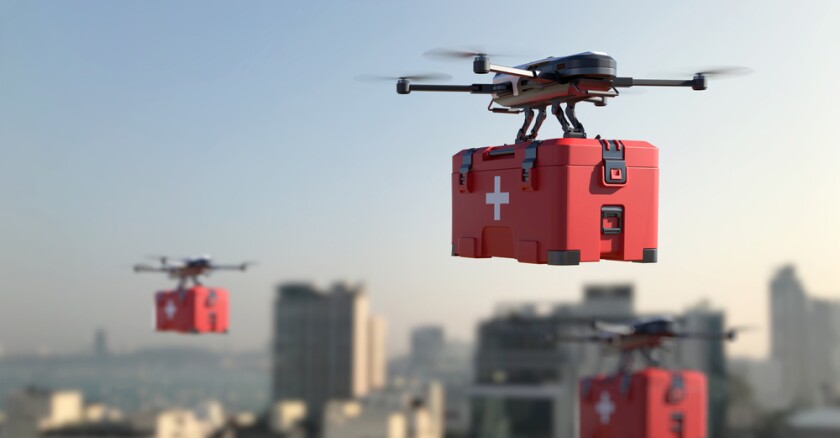The pilot project happened in The Villages, Fla., a planned community for retirees with a population of more than 81,000. The community feedback, said Kevin Wasik, head of business development for UPS' drone airline Flight Forward, was “excellent.”
“You would expect a younger generation to be more welcoming to emerging technology, and we were actually shocked that this community in The Villages were really excited to participate in drone delivery,” said Wasik during a CoMotion LIVE panel Oct. 19. The discussion centered on next-generation logistics, deliveries and the infrastructure technology being currently developed to support it.
UPS has been involved in a similar health-care-related drone pilot project in Africa, in a partnership with autonomous on-demand delivery startup Zipline. Health care may be the sector most suited for drone deliveries, said Wasik.
“The payloads and the needs of the customer are fairly unique,” he said. “There’s a lot more dependency on speed and reliability.”
The development of new forms of package delivery is naturally part of the conversation around autonomous trucking and even curb management and the kinds of solutions needed for “the final 50 feet of delivery,” as Kelly Rula, director of policy and partnerships at the Urban Freight Lab at the University of Washington, described it.
“I do think that pilots and research are just so critical,” said Rula, a former official with the Seattle Department of Transportation, during the panel discussion. “You uncover so many things that maybe you didn’t think would be a problem, a challenge or an opportunity.”
The state of Michigan, through the Office of Future Mobility and Electrification, is exploring autonomous trucking with its 25-mile stretch of autonomous roadway along Interstate 94. The project is a partnership among Cavnue, the state and Ford Motor Company.
The roadway is envisioned as “the road of the future, that lends physical infrastructure, digital infrastructure and interoperability across 40-plus communities,” said Trevor Pawl, chief mobility officer for Michigan, who leads the Office of Future Mobility and Electrification.
Some 70 percent of the state’s economy “in some way touches that corridor in Michigan,” he added.
The future of deliveries is also being explored in Michigan’s electric vehicle charging infrastructure plan, which includes projects to develop in-road wireless charging, as well imagining other pieces of infrastructure roadways will need.
“Are we designing this only for battery-electric?” Pawl pondered about the alternative fuel corridors with their regularly spaced EV charging stations, currently in development.
“Or, are we designing this for whatever comes next?” he continued, calling attention to the likely need for hydrogen fuel-cell infrastructure as well.
Getting roads right for tomorrow’s deliveries and economies will hinge on having government — with its policymaking and regulatory authority — at the table with the private sector and the research community, experts point out.
“I’m hopeful that the future is accepting of autonomous drone operations,” said Wasik. “In order to be successful, I think about the regulatory landscape."
"Unless the government is structured to kind of research and understand the industry, we’re not going to get the changes we need to fly into the airspace,” he added.
And to be sure, drone package delivery will ultimately be incredibly specialized.
“No one’s getting a pizza delivered via drone anytime soon,” Wasik quipped.
But, he added, “It’s not a matter of if. It’s a matter of when. So it is coming, and the private sector and the public sector are working to make sure it brings the most value to local communities.”















